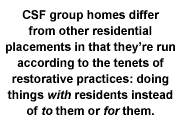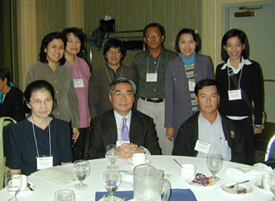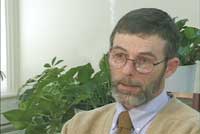Justice
Beyond Punishment: Restorative Community Service
- Details
 CSF youths visit Neshaminy Manor.It’s Saturday morning, and the residents of Neshaminy Manor nursing home in Warrington, Pennsylvania, USA, know what that means. They walk, wheel and shuffle their way into the home’s activity area to take up their regular stations at tables scattered throughout the room.
CSF youths visit Neshaminy Manor.It’s Saturday morning, and the residents of Neshaminy Manor nursing home in Warrington, Pennsylvania, USA, know what that means. They walk, wheel and shuffle their way into the home’s activity area to take up their regular stations at tables scattered throughout the room.
It’s time for cardingo.
The cards/bingo hybrid is a favorite among the residents, and today’s game promises to be especially exciting. As on the first Saturday of every
...Home Work: Life in the CSF Residential Program
- Details
 When I arrived at the Community Service Foundation’s (CSF) foster girls’ group home in Quakertown, Pennsylvania, USA, houseparent Linda Anschuetz showed me into the dining room. She motioned me to a chair by the table, around which six pairs of teen-age eyes—alternately curious and suspicious—focused on me. Who was this stranger who’d arrived in the midst of their safe, carefully structured environment, and what did I want?
When I arrived at the Community Service Foundation’s (CSF) foster girls’ group home in Quakertown, Pennsylvania, USA, houseparent Linda Anschuetz showed me into the dining room. She motioned me to a chair by the table, around which six pairs of teen-age eyes—alternately curious and suspicious—focused on me. Who was this stranger who’d arrived in the midst of their safe, carefully structured environment, and what did I want?
Linda quickly dispelled any misgivings. She told them I was writing about the program and encouraged everyone to introduce themselves and to make me feel welcome. Most of the girls smiled at me. A few looked shy.
Quickly, one of them offered her name and a friendly, “Hi!” The rest, ranging in age from 14 to 17,
...Restorative Justice Takes the World Stage at United Nations Crime Congress
- Details
 Flags from many nations stand outside the U.N. Crime Congress plenary hall.Restorative justice is playing an increasingly significant role in countries all over the globe, and its influence will likely continue to grow. That message emerged clearly-and in many languages-when people from around the world gathered for the Eleventh United Nations Congress on Crime Prevention and Criminal Justice, held April 18-25, 2005, in Bangkok, Thailand.
Flags from many nations stand outside the U.N. Crime Congress plenary hall.Restorative justice is playing an increasingly significant role in countries all over the globe, and its influence will likely continue to grow. That message emerged clearly-and in many languages-when people from around the world gathered for the Eleventh United Nations Congress on Crime Prevention and Criminal Justice, held April 18-25, 2005, in Bangkok, Thailand.
The congress established a “new high-water mark” for
...Family Group Decision Making Reunites a Family
- Details
 Honor student and second-degree black belt in karate Gino LeeFamily group decision making (FGDM, also known as family group conferencing or FGC) has made a big difference in the lives of many families. The story of how FGDM helped one family in Los Angeles County, California, USA, is a textbook example of just how powerful the FGDM process can be. FGDM helped this family ensure the well-being of a child who had fallen through the cracks of the child welfare system. Through an
Honor student and second-degree black belt in karate Gino LeeFamily group decision making (FGDM, also known as family group conferencing or FGC) has made a big difference in the lives of many families. The story of how FGDM helped one family in Los Angeles County, California, USA, is a textbook example of just how powerful the FGDM process can be. FGDM helped this family ensure the well-being of a child who had fallen through the cracks of the child welfare system. Through an
The Nanaimo Community Justice Forum: A Restorative Justice Partnership in British Columbia, Canada
- Details
| The community justice forum model is used across Canada, part of a wider national restorative justice initiative. Restorative justice processes were influenced by North American Aboriginal and other traditional justice practices, in which everyone sits in a circle and speaks in turn, to resolve an issue affecting the community. The RCMP community justice forum resource guide can be viewed here. |
The Nanaimo Community Justice Forum (CJF), in the city of Nanaimo, British Columbia, Canada, is a fine example of how
...Restorative Justice Conferencing with Young Offenders at Brookside Youth Centre and Secondary School, Cobourg, Ontario, Canada: Interview with Michael Maguire, Bruce Schenk and Ron Cameron
- Details
Brookside Youth Centre, in Cobourg, Ontario, Canada, about 70 kilometers east of Toronto, is a secure residential facility and secondary school for young men who have come into conflict with the law, capacity 106. Brookside is using the Real Justice (an IIRP program) model of restorative justice conferencing. Below are excerpts from an interview with Brookside staff members Michael Maguire, superintendent of administration and programs; Bruce Schenk, chaplain and co-coordinator of the restorative justice program; and Ron Cameron, principal of the secondary school. The interview was conducted at “Building a Global Alliance for Restorative Practices and Family Empowerment, Part Two,” the IIRP's Fifth International Conference on Conferencing, Circles and Other Restorative Practices, August 2004, in Vancouver, British Columbia, Canada,
...Restorative Practices at Community Prep High School in New York City
- Details
(A letter from Community Prep co-leaders Ana Bermúdez and Mark Ryan is available here.)
The International Institute for Restorative Practices (IIRP), via its SaferSanerSchools program, is providing training and consulting at Community Prep High School, a public school in New York City for young people just out of juvenile detention. These are the kind of kids who are typically stigmatized as "tough" or "incorrigible" and written off. The story of how the IIRP and Community Prep's staff collaborated to implement restorative practices at this remarkable school was reported in The New York Times.
"Each year, as many as 8,000 New York City students, ages 13 to 18,
...Report on the Fifth International Conference on Conferencing, Circles and other Restorative Practices
- Details
The IIRP's fifth international conference, "Building a Global Alliance for Restorative Practices and Family Empowerment, Part 2," in Vancouver, British Columbia, Canada, was a tremendous success, thanks to the many dedicated participants who journeyed from far and wide to contribute their wisdom and experience to the event. A delegation from the Thailand Ministry of Justice, including Kittapong Kittayarak, director general of the Department of Probation (seated middle), and Wanchai
A delegation from the Thailand Ministry of Justice, including Kittapong Kittayarak, director general of the Department of Probation (seated middle), and Wanchai
"A Survey of Assessment Research on Mediation and Restorative Justice" by Paul McCold: A Summary
- Details
“A Survey of Assessment Research on Mediation and Restorative Justice,” by International Institute for Restorative Practices director of research Paul McCold, has been published as a chapter in the book Repositioning Restorative Justice: Restorative Justice, Criminal Justice and Social Context. The paper provides an overview of 30 years of evaluation research of restorative justice programs from 1971 to 2001. The survey is limited to program assessments available in English and is representative of mediation and conferencing programs that have conducted and published the results of those assessments.
